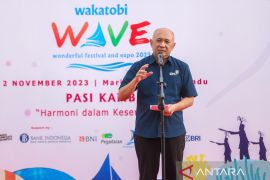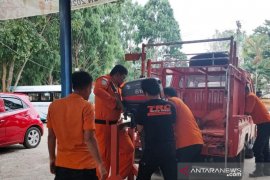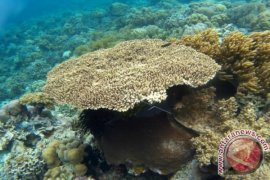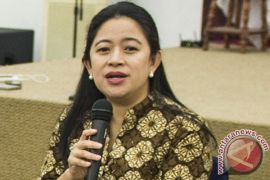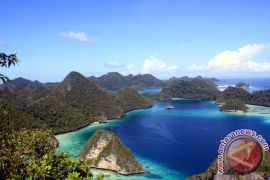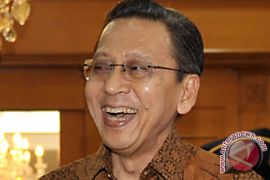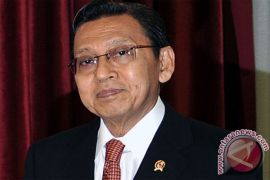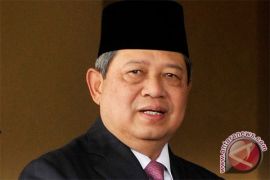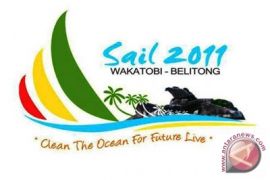The area is made up of a cluster of islands, namely Wangi-Wangi, Kaledupa, Tomia, and Binongko which the local people have abbreviated into the name of Wakatobi.
In an effort to boost preservation of coral reefs in Wakatobi, Southeast Sulawesi, the Indonesian government is currently preparing the opening of a Coral Reefs Conservation School there.
Wakatobi is an area with 25 clusters of coral reefs with wider range of species and various natural resources potential for billions of people.
Therefore the Indonesian government will allocated US$5 million in funds for sustainable preservation and management of coral reefs in Wakatobi.
"The government of Indonesian through President Susilo Bambang Yudhoyono provides five million dollars for sustainable preservation and management of coral reefs in six countries of the Coral Triangle Initiative (CTI)," CTI spokesman Imran said in Wakatobi recently.
Speaking at a meeting of the Association of District Administrations (APKASI) Imran said there were two reasons Indonesia wanted to play a major role in preserving coral reefs in the six CTI member countries.
He said the first was that Indonesia has wider coral reefs than those of the other five other countries and was prepared to turn 20 million hectares of mining areas into national marine parks.
And the second, Indonesian waters have the most diversity of coral reefs namely 70 species of the world`s 850 species.
"The Caribbean sea has only 50 coral reefs and the Red Sea only 300," Imran said.
According to him, coral reefs in Wakatobi must be protected from damage to make them remain sustainable for a certain period of time.
"The management and utilization of natural resources in Wakatobi waters at the center of world coral triangle should consider the principles of sustainable use," Imran said.
He pointed out that the government of Indonesia through the Maritime Affairs and Fisheries Ministry would soon establish the Coral Reefs Conservation School in Wakatobi to support the management and utilization of the natural resources there.
"The establishment of Coral Reefs Conservation School in Wakatobi is part of the government attention to protecting and preserving the coral reefs from damage," Imran said.
President Susilo Bambang Yudhoyono is scheduled to inaugurate the school, the first of its kind in ASEAN and even in the world, in conjunction with the opening of an international marine event of Sail Wakatobi-Belitung 2011 later in June this year.
Meanwhile, Wakatobi district head Hugua said in Kendari recently that an underwater laboratory would be established on Hoga island in Southeast Sulawesi.
"The utilization of the Wakatobi undersea laboratory as a global center for coral reefs and bio-energy study will begin simultaneously with the opening of an International Fishery School, established by the Maritime Affairs and Fisheries Ministry," Hugua said sometime in March this year.
According to him, more than a thousand researchers from various countries would begin work in Wakatobi after the laboratory and the school opened in August 2011.
"Every foreign researcher will be assisted by a national researcher from the Indonesian Institute of Sciences (LIPI) and from various universities in Indonesia," he said.
Hugua said that to be the main supporter of the international fishery school, the underwater lab would become the center of coral reefs and bio-energy research at the world coral reefs triangle in Wakatobi.
According to him, the students of the international fishery school would come from the six member countries of Coral Triangle Initiative (CTI), namely Malaysia, The Philippines, Papua New Guinea, Solomon Islands, Timor Leste, and Indonesia.
Hugua said that to develop the quality of the school, the Wakatobi district government and the Maritime Affairs and Fisheries Ministry would collaborate with a number of universities outside Indonesia.
"We have been communicating with the University of Essex, Cambridge and Oxford in England; Trinity College Dublin University in Ireland, and Harvard University in the United States to work together in improving the fishery school in Wakatobi," Hugua said.
Besides coral reefs conservation school, the underwater laboratory, the international fishery school, a School for Marine Protected Area Management (SMPAM) will also be opened by Maritime Affaris and Fisheries Ministry in Wakatobi.
The ministry`s secretary general Gellwynn Jusuf has said that Japan had committed to provide some Rp70 billion in funds to help finance the project.
The School for Marine Protected Area Management would emphasize the marine sector subjects such as the marine biota diversity, marine conservation, marine energy technology and climate change impact.
In its effort to create professional human resources on marine resources and fisheries, the school`s curriculum would be based on a vocational system and apply factory-teaching field methods, Gellwyn said.
The school would be inline with the local government grand strategy to create Wakatobi as marine Center of Excellence for the marine and tourism sector inside the world`s coral triangle center.
Wakatobi`s existence was known worldwide after around a thousand scientists had done research in the area.(*)
O001/HAJM
Reporter: Otniel Tamindael
Editor: Jafar M Sidik
Copyright © ANTARA 2011
